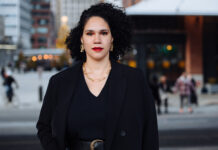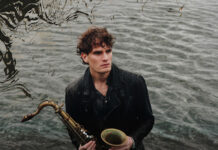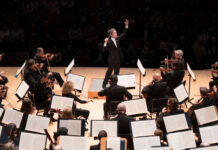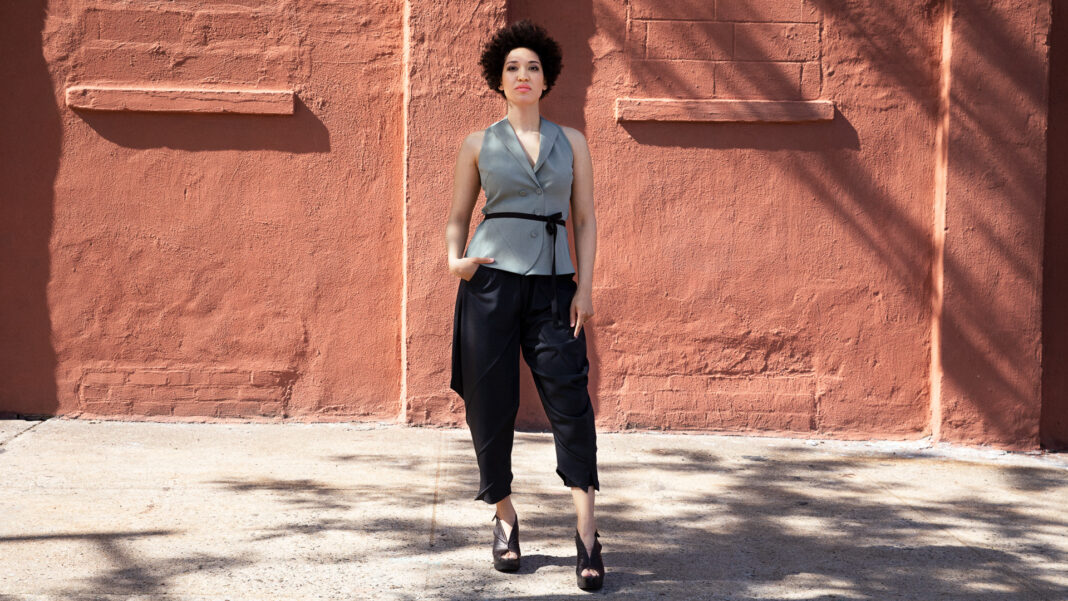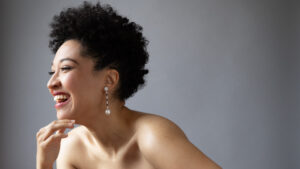
This year is going out with a bang for soprano Julia Bullock. She’s curated the Rock Your Soul Festival with the Los Angeles Philharmonic that starts in earnest on November 5th and runs through November 22nd. She has her first solo recording coming out from Nonesuch Records. It’s called Walking in the Dark. Finally she and pianist/conductor husband Christian Reif are expecting their first child any day now.
Rock Your Soul Festival was originally conceived by the LA Phil as a celebration of the work and friendship of Florence Price and Margaret Bonds. The title harkens back to a spiritual (Rock My Soul in the Bosom of Abraham) and a book by noted author and activist Bell Hooks (Rock My Soul: Black People and Self-Esteem).
Amongst the artists Bullock has assembled for the festival are soprano Michelle Bradley, mezzo-soprano J’Nai Bridges, pianist Michelle Cann (look for our interview with her later this week), singer/composer Rhiannon Giddens, conductor Jeri Lynn Johnson, singer/songwriter Meshell Ndegeocello and mezzo-soprano Jasmine White.
Walking in the Dark finds Bullock performing works by John Adams, Samuel Barber, Oscar Brown Jr., Connie Converse and Sandy Denny. It’s a beautiful record that is set for release on December 9th. Reif plays piano on the recording and leads the Philharmonia Orchestra of London as well.
Bullock’s pregnancy precludes her from performing in Rock Your Soul Festival, but it did allow for other opportunities which she described in our conversation recently. What follows are excerpts from that conversation which have been edited for length and for clarity.
I want to start by asking you about something you told Zachary Wolff in the New York Times in 2019. It was advice your mother gave you: “Make sure that your work is making a difference for the betterment of the world.” You seem to have taken up that challenge and made it your mission. How do you think that has made your career different than others and, by extension, more fulfilling for you?
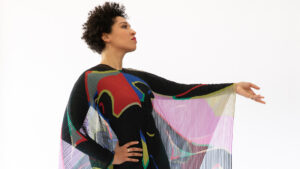
Well, I don’t know if it’s made it so much different from other people’s. I think every artist has a call in one way or another to have a mission or have their their passion realized. I don’t have a casual relationship with music. In fact, my desire to sing and also share music is because I know the impact that it’s had on my life and also how it’s enriched my life and helps me feel more interconnected and engaged.
I guess I’m always looking for ways to deepen that exploration and enjoy it in the process. I find that most of the artists whose work I really love also have this sort of mission. They’re very much conscious of the world that was going on around them and trying to make sense of it or call out hypocrisies. I’m not sure if I feel it’s so different than what other artists are doing. I guess I’ve just given myself permission to expand that in as many directions as I can imagine.
I would assume that in doing that, when someone like Peter Sellars says “Her path is going to be our path,” that’s got to be both hugely flattering and also a bit of a mantle to take on on a certain level.
I truthfully don’t like to be positioned in any capacity. I appreciate that Peter feels that the way that I work, the reflections that I have, and just the fact that I’m really dedicated to my craft and my own development and learning, is something that he wants to celebrate. I guess I celebrate that, too. That would be part of why, in the performing arts in particular, I don’t take that pressure on because that’s just a projection of something. The work that I do is not trying to live into some projection of Julia.
In the liner notes for Walking in the Dark you conclude your statements in the liner notes with “If our intentions are translated well enough and are clearly in focus, it may lead to some moments of illumination.” What has been the process of making your intentions perfectly clear with the Rock Your Soul Festival?
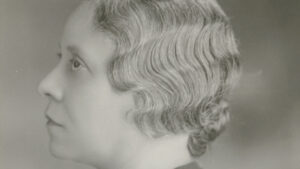
It was their idea, not the title or anything like that, but just the proposal to curate a program that was focusing on the relationship between Margaret Bonds and Florence Price. Other than their vocal music and really just their songs, I was not too familiar with a lot of their repertoire – the breadth of their repertoire. It was an opportunity for me to again delve into some research and take six, seven months to consider the work of composers that I had not had the time or had this opportunity to look at.
I was reading about their personal lives and also this relationship of mutual support. They had this teacher (Price)/ student (Bonds) relationship. When there were really troubling times for Florence Price in her personal life she went and lived with Margaret Bonds for a period of time. That really communicated this beautiful thing. It wasn’t just about their artistic output. It was also about nurturing and respecting each other as human beings and fully supporting each other that way. That was something I really wanted to celebrate and acknowledge besides just sharing their repertoire.
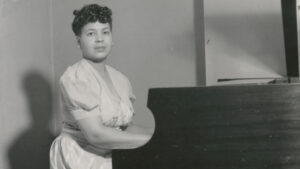
Every single artist that was invited into the festival there is this feeling of mutual support. Every single composer that I know, that I work with personally and also the composers that I either read their letters or biographies, they openly admit how influenced they are by the people who are around them. And they seek out guidance and advice. They are influenced by what’s going on socially, politically.
I think we can learn a lot from what Florence Price and Margaret Bonds did in terms of shared experiences as musicians and as human beings. Because it goes without saying that a lot of people care more about ideologies and less about each other as human beings right now. Perhaps the festival can find a way to bridge that divide.
It can be very closed and people can get very closed. Growing up listening to recordings, my family had vinyls or cassettes playing all the time. A lot of the time we listened to music together. Even if I was alone I was still playing music, not locked into an earphone or earbuds privately, it was something that was heard in the house – the shared space. I think music can foster some really beautiful acknowledgment of each other. It’s not just some theoretical exercise. It’s like actually putting it into practice. I think that’s probably what drove me and that’s what drives most musicians to make music. Because you’re wanting a shared experience and wanting to share your own experience as well.
Once you became pregnant and knew that being here for the festival wasn’t going to be possible did that give you any opportunities to make changes or add other things that maybe couldn’t fit into the program because you were a part of it at one point and now you were not?
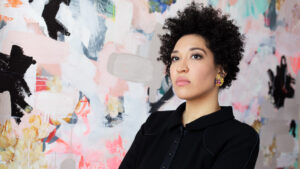
I’m sad. I’m just not going to be there. Obviously I’m growing a human being. So that’s what it is.
I was supposed to perform History’s Persistent Voice, which featured a lot of contemporary composers who are all Black women. That was an hour-and-a-half program. I decided to save this for another season and think about another program.
That was a great opportunity to perform one of Florence Price’ full symphonies. It was also an opportunity then for me to think about the composers who were associated with History’s Persistence Voice and look at some of their other pieces and see if there was a way to feature their work.
I’m really excited Courtney Brian’s Sanctum is included. Her work is just super powerful and I’m so glad that that is going to have a premiere at the LA Phil. Valerie Coleman’s selections from her Phenomenal Women will be featured as well. It’s the first time that she will have anything performed at the Phil.
Your first album is going to be something that was to be considered carefully. Now that you’ve recorded it, and I know from earlier in this conversation you haven’t listened to it recently, but what would you like listeners to know about you from hearing the choices that you made for Walking in the Dark and the performances you give?
What do I want them to know about me? I really hope it is just an invitation. All of the music that’s on this is material I’ve lived with for honestly two decades and some of it I’ve performed for a decade. The chance to lay it down and be a part of a recording legacy of some of these pieces that have also been recorded by so many different artists was a rare and wonderful opportunity. It’s not one that I take for granted.
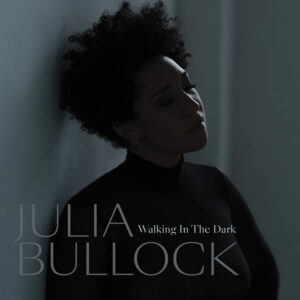
Walking in the Dark, I mean the title of it. I didn’t write this in the liner notes and I’ve only brought it up to a few people, but I want to make it very clear that darkness is not something that should have, in fact, any kind of negative association. I feel in some ways that darkness, or blackness even, has been conditioned in certain parts of societies or cultures to have negative connotations and somehow promotes the idea of a white supremacist ideology. That really is not something that I can tolerate.
I guess it’s been something I have grappled with – a collective question about identity or I have felt that I have had to question my identity for a very, very long time. I made a lot of peace with who I am and how I also am expanding in the various roles that I can take on and feel comfortable in.
James Agee, who probably needs no introduction to you since his poetry inspired Samuel Barber’s Knoxville Summer of 1915 (which Bullock performs on Walking in the Dark), is quoted as saying, “Some people get where they hope to in this world. Most of us don’t.” I feel like in watching your career over the last number of years that you’re actively working through your art and through your activism to get the world to where you hope it will be. As a soon-to-be mother, what is the world you’d like to see your child living in and how do you think your art can pave a path for that to be a reality?
Well, I hope that this child will feel safe. That the child will not be limited in anything that they want to invest in and enjoy. That there will be not be a lot of assumptions made or anticipated projections of this child and what they feel they have to represent so that they can just live their lives. But there’s something in safety that feels really important right now.
Photos of Julia Bullock (By Allison Michael Orenstein/Courtesy Askonas Holt)


